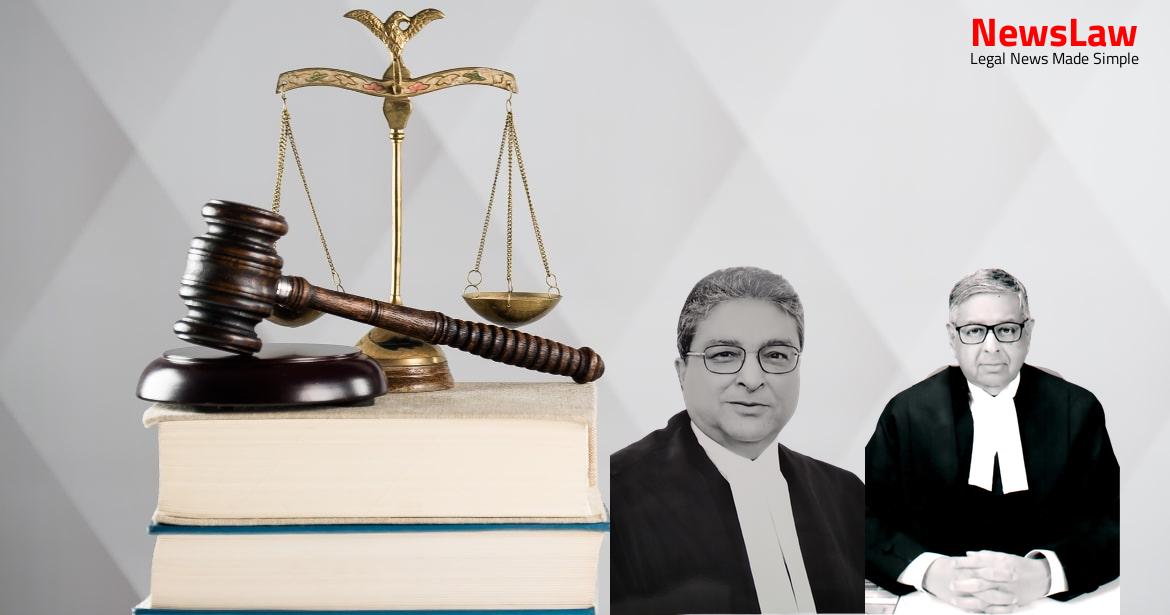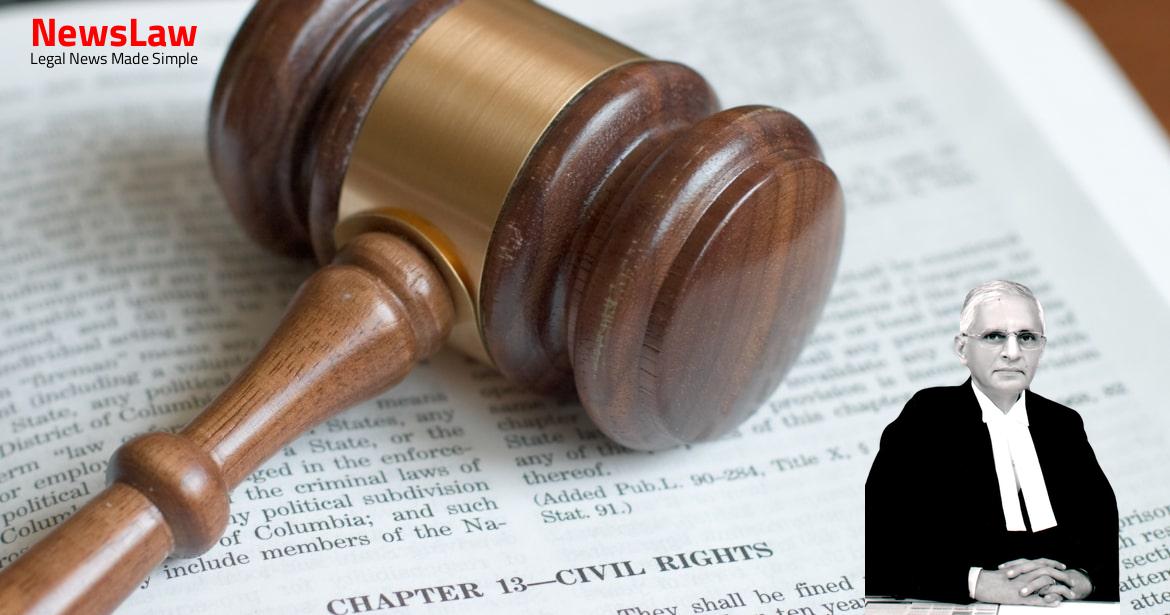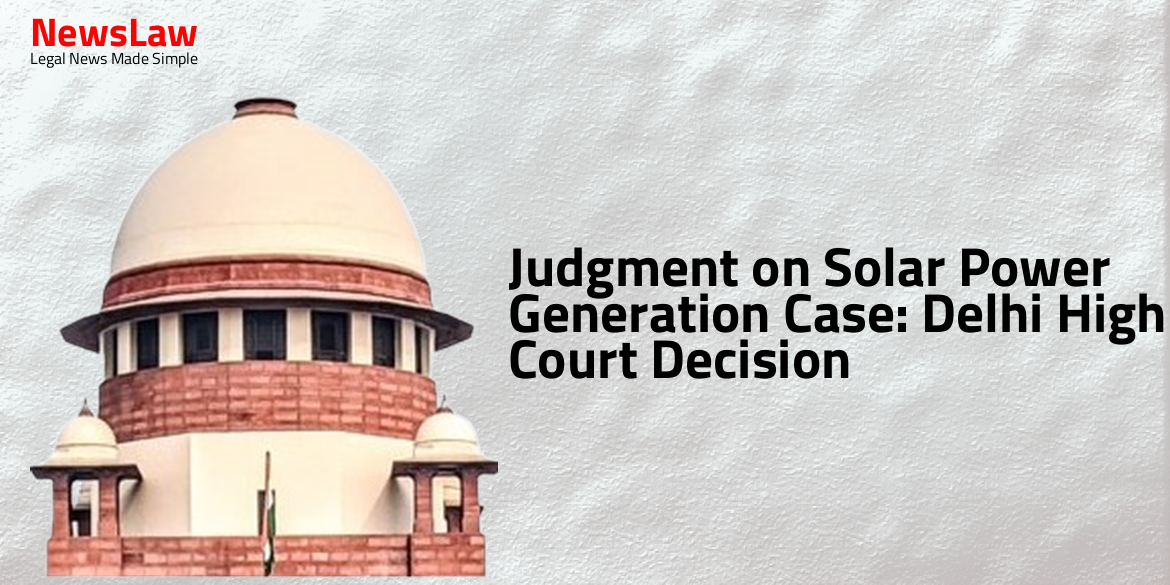Explore a complex legal battle where the court delves into the interplay between secured creditor rights and confiscation orders. Discover how the court’s legal analysis on priority of debts, the impact of Acts, and past precedents shape the final verdict in this intriguing case.
Facts
- The High Court order was challenged through a Special Leave Petition.
- RIL was issued a show cause notice for evasion of excise duty and violation of the Central Excise Act, 1944.
- Orders for confiscation of properties and imposition of penalties were confirmed against RIL.
- RIL had mortgaged/hypothecated its properties to the Appellant bank to secure a loan.
- The bank initiated action under SARFAESI Act due to default in loan repayment by RIL.
- Customs & Central Excise Department claimed that the properties of RIL were already confiscated, so the bank could not take possession.
- An appeal against the order of confiscation was filed by Respondent no. 4.
- Certain sections and rules related to confiscation were mentioned, indicating the legal background of the case.
- The Appellant bank filed a Writ Petition against the orders of confiscation and subsequent communications by the department.
- The Allahabad High Court dismissed the Writ Petition stating that the properties confiscated by the Central Excise Authorities vest in the Central Government.
- The Court explained that if any property is confiscated, it vests in the state, and no person can claim any right, title, or interest over it.
- The High Court held that the question of first or second charge over the properties does not arise in this case.
Also Read: Judicial Review in Disciplinary Proceedings
Issue
- Confiscation order passed by Respondent No 2 for land, building, plant, and machinery of RIL being questioned
- Security interest created by RIL in favor of Appellants and other banks after 8 years of confiscation proceedings
- Debate on whether security interest can override confiscation order
Also Read: Legal Analysis in Company Law Case
Arguments
- The Appellant’s Senior Counsel contended that the Commissioner did not have the authority to invoke Rule 173Q(2) of the Central Excise Rules, which had been omitted from the statute book in 2000, for the confiscation orders dated 26.03.2007 and 29.03.2007.
- The ASG argued that the confiscation proceedings were initiated 9 years before the charge was created, and a charge cannot affect ongoing confiscation proceedings.
- The ASG further contended that the Crown debts have no priority over secured creditors, citing various legal precedents. The Appellant bank’s secured creditor status under the SARFAESI Act, 2002, gives it first charge on the secured assets.
- The ASG argued that Section 38A of the Central Excise Act, 1944, and Section 6 of the General Clauses Act, 1897, saved the proceedings initiated under Rule 173Q(2) even after its omission from the statute book, as they protect rights and liabilities acquired or accrued and ongoing investigations.
- The ASG also argued that the issue of priority between the rights of the Excise department and secured creditors did not apply here, as the confiscation order against RIL was penal in nature and did not involve mere recovery of dues.
- The ASG supported this argument by highlighting differences in the rules regarding confiscation between the 1944 Rules and subsequent rules, showing that the focus shifted from confiscating ‘anything’ to confiscating ‘goods’.
- The Appellant may resort to the mechanism under section 13(4)(d) of the SARFAESI Act to recover amounts due.
- Any right of recovery from Respondents would allow the Appellant to issue a notice as per Section 13(4)(d) of the SARFAESI Act.
- The court did not interfere with the seizure but recognized the secured creditor’s right to satisfy the debt even after government seizure.
- The validity of the confiscation order cannot be challenged solely because the Appellant is a secured creditor, as per the SARFAESI Act.
Also Read: Summons Issuance by Magistrates in Criminal Cases
Analysis
- Confiscation orders dated 26.03.2007 and 29.03.2007, passed by the Commissioner Customs and Central Excise, Ghaziabad, were quashed.
- Rules such as Rule 173Q(2) of the Central Excise Rules, 1944 were omitted from the Statute books, affecting confiscation orders.
- The introduction of Section 11E in the Central Excise Act, 1944 had an overriding effect on the provisions of the Act.
- The SARFAESI Act, 2002 provisions took precedence over the Central Excise Act of 1944.
- The proceedings initiated under Rule 173Q(2) were deemed concluded upon repeal of the rule.
- Common law principles dictate that repealing a statute or deleting a provision obliterates it from the statute book.
- The priority of debts to the Government and secured creditors over Crown debts were highlighted.
- Provisions like Section 38A(c) and 38A(e) of the Central Excise Act, 1944 were not applicable in certain contexts.
- Secured creditors were entitled to preference over claims by the Central Excise Department.
- Decisions in previous cases, affirming the rights of secured creditors, were upheld.
- The High Court misinterpreted the issue by stating that the question of first charge or second charge over the properties would not arise.
- A Full Bench of the Madras High Court discussed the priority of a secured creditor over Crown debt, stating that the rights of a secured creditor prevail over unsecured creditors like the Excise Department in the absence of liquidation.
- The Bombay High Court also held that the provisions of the SARFAESI Act override the priority of tax dues under the Central Excise Act, giving precedence to secured creditors.
- The Supreme Court dismissed an SLP in favor of the priority of secured creditors over Crown dues.
- In a previous case involving Bank of Bihar, the Supreme Court ruled that the rights of a secured creditor take precedence over unsecured creditors like the Cane Commissioner and workmen.
- The Gujarat High Court clarified that confiscation under Rule 28 only applies to goods, not immovable property.
- Section 11 of the Central Excise Act, 1944 deals with the recovery of sums due to the Government and the authority of Central Excise Officers to confiscate and hold possession of confiscated goods.
- Rule 28 of the Central Excise Rules, 2002, and Rule 28 of the Central Excise Rules, 2017, both specify that confiscated property shall vest in the Central Government.
- Section 2(zc) to 2(zf) of the SARFAESI Act, 2002 defines terms related to secured assets, secured creditors, secured debt, and security interest.
- Section 38A of the Central Excise Act, 1944 addresses the effect of amendments, repeal, supersession, or rescinding of rules, notifications, or orders under the Act.
- Section 11E of the Central Excise Act, 1944 establishes that any amount payable under the Act shall be a first charge on the property of the assessee or person.
- Rule 173Q of the Central Excise Rules prior to 12.5.2000 outlined provisions regarding confiscation and penalty for contraventions by manufacturers, producers, or warehouse licensees.
- Rule 211 of the Central Excise Rules specifies that confiscated property shall vest in the Central Government and outlines the procedure for taking and holding possession of confiscated goods.
Case Title: PUNJAB NATIONAL BANK Vs. UNION OF INDIA THR. ITS SECRETARY (2022 INSC 230)
Case Number: C.A. No.-002196-002196 / 2012



